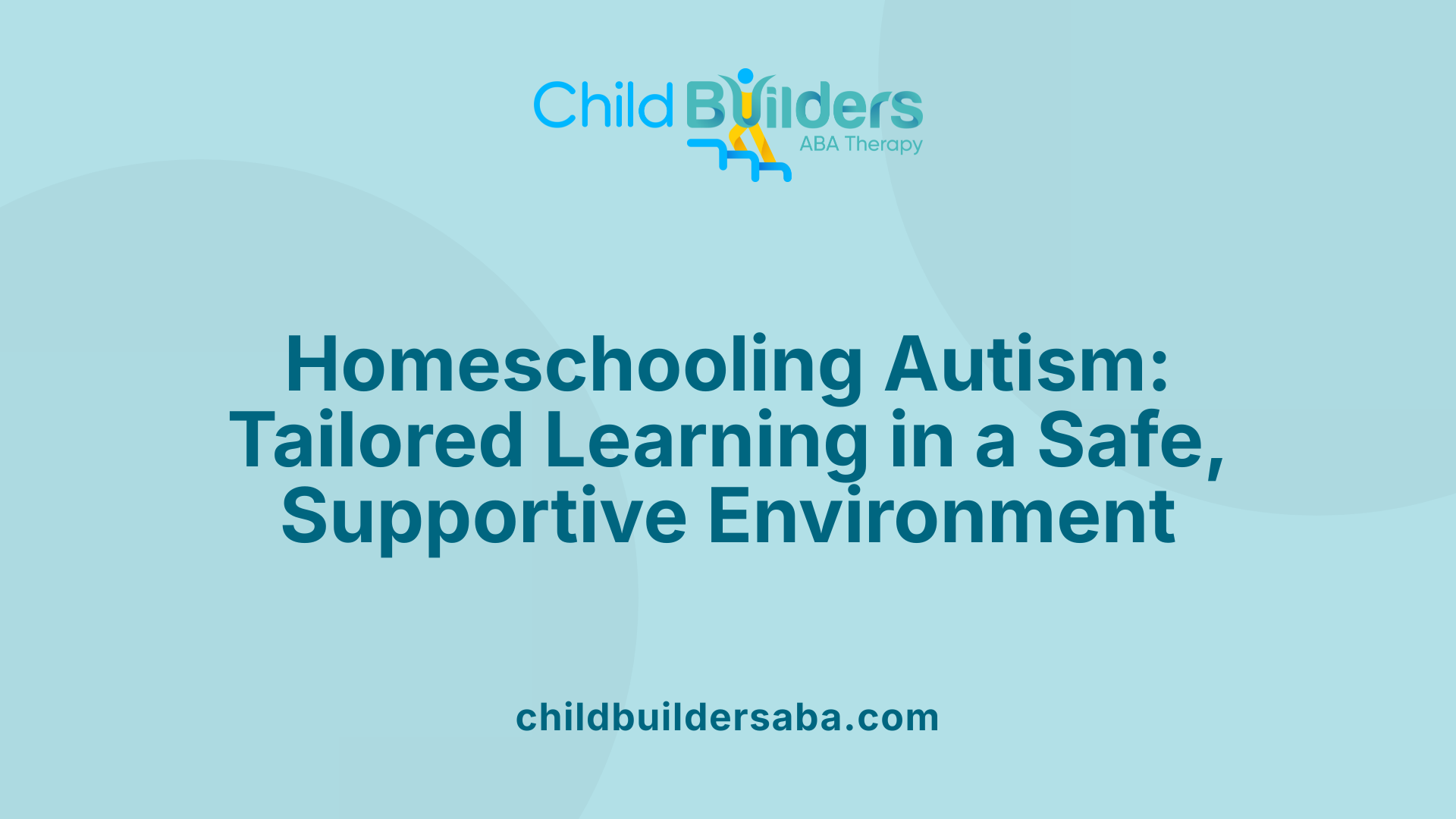Homeschooling a Child With Autism

Homeschooling Autism: A Personalized Pathway to Learning and Growth
Homeschooling a child with autism presents a unique opportunity to craft a highly individualized educational experience that meets the specific needs, strengths, and interests of the learner. This approach can foster emotional well-being, academic progress, and social skills development within a safe and supportive environment. While it requires considerable planning, dedication, and resourcefulness from parents, the benefits of flexibility and customization often outweigh the challenges, making homeschooling an increasingly popular choice for families seeking a holistic and responsive education for their children with autism.
Legal Landscape and Planning for Homeschooling with Autism
 Homeschooling laws are dictated by each state, and parents need to familiarize themselves with their specific legal requirements to ensure compliance.
Homeschooling laws are dictated by each state, and parents need to familiarize themselves with their specific legal requirements to ensure compliance.
Most states require parents to submit a Notice of Intent to their State Department of Education or equivalent authority. This notification formalizes their decision to homeschool and often includes information about the curriculum or a description of the educational plan.
In addition, many states mandate annual standardized testing or assessments to monitor student progress, especially for children with special needs like autism. These evaluations help ensure that homeschoolers are meeting state educational standards.
Parents considering homeschooling should consult the official websites of their state's Department of Education to understand detailed requirements. Resources like the Home School Legal Defense Association (HSLDA) or local homeschool groups can provide guidance on legal obligations and best practices.
Table: Homeschooling Legal Requirements by State
| State | Notification | Testing | Special Needs Provisions | Resources |
|---|---|---|---|---|
| North Carolina | Yes, submit a Notice of Intent | Yes, annual standardized tests | No specific laws but recommended to consider accommodations | NC Department of Education, HSLDA |
| Texas | Yes, register with local district | Yes, standardized tests | IEPs recommended, though not legally mandated | Texas Homeschool Coalition, THSC |
| California | Yes, file affidavit | No mandatory testing | Resources available for special needs homeschooling | California Department of Education |
Understanding these legal frameworks is crucial for parents, especially when homeschooling children with autism, to ensure their educational choices meet legal standards while providing a tailored learning environment.
The overall outlook on homeschooling children with autism remains positive. It offers a highly individualized and flexible setting suited to each child's unique profile. Homeschooling enables parents to include evidence-based therapies such as ABA, create sensory-friendly routines, and focus on social skills development in safe and controlled environments.
This approach reduces potential issues like sensory overload or bullying encountered in traditional schools. Additionally, the small class sizes and the ability to incorporate the child's interests can foster emotional well-being and developmental progress.
Nonetheless, homeschooling requires substantial parental commitment, resource availability, and careful planning. Access to appropriate curricula, community social activities, and professional support play vital roles in success. Although socialization can seem challenging, parents can engage children in local groups, co-ops, and extracurricular activities.
In summary, understanding state laws and planning accordingly are essential steps for families choosing to homeschool their children with autism. By combining legal compliance with thoughtful educational strategies, homeschooling can be a rewarding and effective approach to supporting these children’s growth and learning.
Benefits and Challenges of Homeschooling Children with Autism

What are the pros and cons of homeschooling a child with autism?
Homeschooling a child with autism can offer many heartfelt advantages. It allows for customized teaching tailored to the child's specific strengths, needs, and interests. This personalized approach can lead to better engagement and a deeper understanding of concepts. Families can create flexibile schedules, fitting education around therapy sessions, sensory needs, and routines to reduce anxiety and sensory overload.
A significant benefit of homeschooling is the safe, controlled environment it provides. Without the exposure to bullying or negative social dynamics often found in traditional schools, children can learn in a calm, supportive setting. Parents can incorporate therapies like speech or occupational therapy into daily activities, making them more accessible and relevant.
Socialization, often a concern for homeschooling families, can be supported through playdates, local groups, and community activities designed for children with special needs. This fosters social skills while maintaining a level of control over the social environment.
However, homeschooling also comes with challenges. It requires a substantial investment of time and effort from parents, who often must juggle teaching, caregiving, and managing household responsibilities. The financial impact can be significant, especially if parents need to buy specialized curriculum, therapy resources, or hire tutors.
Parents may feel under-qualified or overwhelmed, especially when addressing complex needs like communication or sensory processing. Social opportunities might be limited compared to traditional schools, potentially affecting the child's social development if not carefully managed.
Furthermore, homeschooling can lead to feelings of isolation for both children and parents. Finding local support networks and engaging regularly in social activities are crucial to mitigate this.
In summary, homeschooling a child with autism offers tailored educational experiences and a safe environment, but it requires careful planning, resources, and ongoing effort to overcome potential drawbacks such as socialization challenges and resource limitations.
Curriculum Choices and Educational Resources for Autism

Are there specific curriculum options or educational resources designed for children with autism?
Yes, there are a variety of curriculum options and resources specifically developed to support children with autism. These programs aim to address the unique learning needs of autistic children and often incorporate structured, multisensory, and adaptable approaches.
One well-known program is TeachTown, which offers structured lessons focusing on social skills, communication, and behavioral development. These tools are designed to cater to different age groups and learning levels, ensuring individualized support.
The ACE ABA Software System applies principles of Applied Behavior Analysis, a widely used therapy for autism. It helps improve behaviors, social interactions, and communication skills through data-driven interventions.
Online platforms now offer flexible solutions such as Gemm Learning’s Fast ForWord. This program targets language, reading, and processing difficulties rooted in brain plasticity. It’s adaptive, allowing children to progress at their own pace while providing regular progress reports.
Time4Learning is another popular choice for homeschooling, giving customizable curricula aligned with state standards. It incorporates visual, auditory, and interactive elements, making learning engaging for children with autism and supporting various learning preferences.
Innovative programs like WiloStar3D utilize virtual environments to foster creativity and critical thinking. Designed for children with Asperger’s Syndrome, this program emphasizes project-based learning within flexible, computer-based settings.
In addition to specific curricula, parents and educators can access a wealth of online and community-based resources. These include support groups, tutoring services, and educational software tailored to support the developmental needs of children on the autism spectrum.
Choosing the right curriculum often involves considering the child’s specific challenges, interests, and learning style, with many programs offering trial periods to help find the best fit.
Strategies and Guidelines for Effective Homeschooling

What strategies and guidelines can support homeschooling children with autism effectively?
Homeschooling children with autism requires thoughtful and personalized strategies to ensure they receive a supportive and effective educational experience. A fundamental step is to create a structured environment using visual tools such as visual schedules, timers, and pictorial cues. These help children anticipate what comes next, reducing anxiety and aiding compliance. Establishing consistent routines, including wake-up, meal, and bedtime schedules, provides stability that is especially beneficial for autistic children.
Incorporating sensory supports and interests into daily activities can significantly enhance engagement. This might involve using sensory-friendly materials, incorporating movement breaks, and including activities that align with the child’s passions—such as music, animals, or swimming—making learning enjoyable and tailored.
Connecting with support networks, including local homeschooling groups, autism specialists, therapists, and online communities, offers valuable guidance and social opportunities. These connections provide social interaction for children and support for parents, creating a network of shared resources, advice, and emotional encouragement.
Adapting teaching methods to meet sensory sensitivities is crucial. This includes providing quiet spaces, adjusting lighting and noise levels, and using tactile-friendly teaching materials. Flexibility in lesson timing and content allows children to learn at their own pace, reducing frustration and fostering confidence.
Monitoring progress is an ongoing process that involves regular assessment and data collection. Using low-pressure evaluation tools, parents can identify areas of strength and challenge, then adjust strategies accordingly. This iterative approach ensures that educational plans remain responsive and effective.
In addition, obtaining access to services such as behavioral supports, speech and occupational therapy, and social skills training—whether through local providers or online platforms—supports holistic development. Advocating for sufficient funding and community resources further enhances the scope of available support.
By implementing these personalized and adaptable guidelines, parents can create a nurturing homeschool environment that promotes learning, development, and well-being for children with autism.
Practical Tips and Community Support Resources
What are some practical tips and considerations for parents homeschooling children with autism?
Homeschooling children with autism requires careful planning and tailored approaches to meet each child's unique needs. Parents should start by creating individualized, flexible curricula that consider the child's interests, learning preferences, and sensory sensitivities. Incorporating visual aids such as schedules, charts, and timers helps establish a predictable routine that can reduce anxiety and improve focus.
Establishing consistent daily routines is crucial. Using visual schedules and sensory tools like fidget toys or noise-canceling headphones supports a calming environment. Regular sensory breaks and hands-on activities can help manage sensory overload and maintain engagement.
Support networks are invaluable. Parents should connect with autism-focused groups, both locally and online, such as Facebook groups or community co-ops. These communities offer resources, shared experiences, and emotional support, making homeschooling less isolating.
Utilizing online resources and specialized programs, such as Time4Learning or Fast ForWord, can aid in comprehensive skill development while accommodating different learning styles. These platforms often include progress tracking, adaptive challenges, and multisensory approaches, which are beneficial for autistic learners.
Fostering social skills and life skills is also vital. Organizing social activities, such as playdates, community classes, and extracurriculars like music or sports, promotes socialization and confidence. Involvement with local homeschooling groups or co-ops can provide opportunities for interaction.
Legal and documentation considerations are important to ensure compliance with state laws. Parents should familiarize themselves with local requirements, like maintaining progress records, submitting notices of intent, or participating in standardized testing if required. Keeping meticulous records supports planning, evaluation, and future educational planning.
By blending these practical strategies with community engagement and resources, homeschooling can be a rewarding and effective approach for children with autism. It allows customization, promotes safety, and nurtures growth through supportive, adaptive learning environments.
Support Resources, Communities, and Continued Learning
Are there support resources, guidance, or communities available for parents homeschooling children with autism?
Absolutely. Parents of children with autism who choose to homeschool have access to a wide range of support networks and resources. Local and online support groups are valuable for sharing experiences, advice, and encouragement. These groups often include other homeschooling parents and can be found through autism organizations, community centers, or homeschooling associations.
Homeschooling cooperatives and networks play a crucial role in providing structured social opportunities, curriculum sharing, and joint activities. These groups can be particularly helpful for children with autism, offering tailored social interaction settings and peer support.
Numerous resources are available from autism organizations like Autism Speaks, the Autism Society, and online forums such as Autism Parenting Magazine. These platforms provide guidance on managing routines, behavior strategies, therapy integration, and educational planning. Parents can also find online communities via Facebook groups, dedicated forums, and specialty homeschooling platforms like HSLDA, which offer resources, legal guidance, and peer support.
Guidance for parents and caregivers includes access to professional services such as therapists, tutors, and specialists familiar with autism. Many organizations offer webinars, articles, and support networks designed specifically for homeschooling families facing autism-related challenges.
Ultimately, these resources help parents craft personalized educational plans, address sensory and behavioral needs, and foster social connections, ensuring children with autism receive a supportive, enriching homeschooling experience.
Empowering Parents for Success
Homeschooling children with autism requires a dedicated, well-informed approach that balances personalized teaching with structured routines and support networks. By exploring tailored curricula, engaging community resources, and implementing effective strategies, parents can create a nurturing educational environment that promotes both academic achievement and emotional well-being. While challenges are inevitable, the reward of witnessing their child's growth and confidence makes homeschooling a rewarding pathway. Success in homeschooling for children with autism hinges on continuous adaptation, collaboration with professionals, and a strong community of support, turning the home into a vibrant, inclusive hub of learning and development.
References
- Homeschooling Your Child with Autism
- Special needs homeschooling curriculum - Time4Learning
- Practical Advice for Homeschooling a Child with Autism
- Homeschooling Toolkit - Autism Society of NC
- Homeschooling Autistic Kids: Can You Do It? - Raising Wild Saints
- Pros and Cons of Homeschooling a Child with Autism
- Homeschooling Your Child with Autism
- Homeschool Autism Program by Gemm Learning

























.jpg)











































































